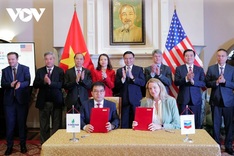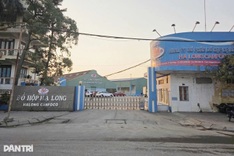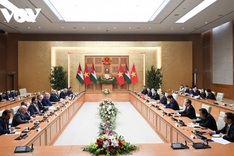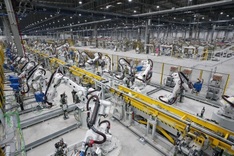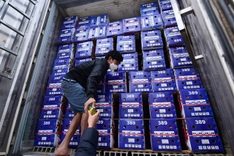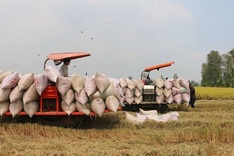Vietnam's logistics industry has many natural advantages and is well placed, to help develop a regional hub, or free port called logistic parks, experts said, according to the Vietnam news agency (VNA).
However, the experts also stressed that Vietnam will lose the opportunity if it does not act in haste. They (experts) underlined to most important opportunity for Vietnam, is the trade liberalistan process following its free trade agreement with the World Trade Organisation (WTO), ASEAN (Association of Southeast Asian Nations) and Asia-Pacific Economic Cooperation (APEC).
They (experts) underlined to most important opportunity for Vietnam, is the trade liberalistan process following its free trade agreement with the World Trade Organisation (WTO), ASEAN (Association of Southeast Asian Nations) and Asia-Pacific Economic Cooperation (APEC).
Experts said that the trade between Vietnam and foreign countries are expected to boom in the near future, resulting in a boom in demand for logistics services.
To exploit this opportunity, Vietnamese businesses need to improve their capabilities through a variety of measures, experts say.
A senior expert for the United Nations Economic and Social Commission for Asia and the Pacific (UNESCAP) said revenues from Vietnam's logistic services account for 15 to 20 per cent of the gross domestic product (GDP) which is estimated at US$93.5 billion for 2009 by the World Bank.
However, all Vietnamese logistic businesses take only a very small slice of the domestic market pie at 35 per cent.
About ten foreign logistics corporations including Maersk Logistics, MITSUI OSK, APL and Logitem dominate the market, the Vietnam news agency (VNA) said.
Logistics means a chain of services to receive and deliver goods, including a lot of links such as freight, transportation, customs clearance and storage.
Given this, Vietnam is believed to have conditions and terrain highly favourable for developing the logistics industry.
It is one of few countries having all kinds of traffic with over 17,000 kilometres of asphalted road, over 3,200km of railroads, 42,000km of waterways, and 49 seaports and 20 airports.
The Vietnam Freight Forwarders Association (VIFFAS) said there are around 800 Vietnamese businesses in the logistic sector.
Ho Chi Minh City's Department of Planing and Investment grants a licence for a logistics company every week, demonstrating the attractiveness of the industry.
Meanwhile Officer Manager for the Vietnam Freight Forwarders Association (VIFFAS) Nguyen Hung said the domestic logistics industry faces a lot of difficulties, especially the inadequate traffic infrastructure that is unable to meet the demand for cargo transportation.
He said except for Ho Chi Minh City's Tan Son Nhat Airport are equipped for the operations of freight planes, while other international airports like Noi Bai in Hanoi and Da Nang in central city are not equipped for such operations.
Without routine maintenance and development, most asphalted roads and railroads have been downgraded and are too narrow, limiting cargo transportation nation-wide.
Experts, quoted by the Vietnam news agency, believed that marine transportation is the most important link in the chain of logistic services as up to 90 per cent of imports and exports, are transported through the sea.
However, some experts cautioned that marine transportation could also be the weakest part of Vietnam's logistics industry.
Vietnamese shipping companies can only cover 18 per cent of the total demand and the remaining huge chunk is controlled by foreign corporations.
"We do not have any deep seaports to dock large-sized cargo ships of over 80,000 DWT and container ships of over 6,000 DWT so far," said Hung.
"Besides, the connections between seaports and roads, railroads and canals have not been completed, decreasing cargo transportation capacity from seaports to land."
Moreover, because they do not have complete marine transportation capabilities, most Vietnamese companies are forced to sell FOB (Free On Board) and purchase CIF (Cost, Insurance and Freight).
This means Vietnamese companies without their own fleet lose out on a huge portion of the total cost of the chain of logistic services to foreign corporations.
Apart from backward traffic infrastructure, Vietnamese logistics firms face many other barriers.
Most of them have no representative offices outside the country, and thus cannot land large contracts providing logistic services in Vietnam to international corporations, because bids for such contracts, are organised outside Vietnamese territory.
Not surprisingly, the contracts are invariably snapped up by multinational corporations.
Among the other weakness are the lack of qualified staffs and the IT systems used are not up-to-date, and Vietnam's logistic industry is low competitiveness.
"This is because there are too many Vietnamese logistic companies, most of them are small size industry registered with a capital of some 1.5 billion Vietnam Dong (VND) (US$81,190)," Hung said, adding that only a few logistic companies have the capabilities to provide a complete service packages.
Vietnam well placed to become logistics hub
Vietnam's logistics industry has many natural advantages and is well placed, to help develop a regional hub, or free port called logistic parks.
Source: dtinews.vn

